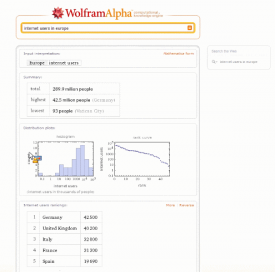...or rather, A New Kind of Search Engine.
This looks revolutionary and very, very cool. Scheduled for release next Monday. I only hope it isn't all hype.
Stephen Wolfram Reveals Radical New Formula for Web Search
Could Wolfram|Alpha Sway Google Regulators?
Site: Wolfram|Alpha
Incidentally, I bought Wolfram's A New Kind Of Science when it first came out and was unimpressed. It seemed like a lot of ego stroking.
This looks revolutionary and very, very cool. Scheduled for release next Monday. I only hope it isn't all hype.
Stephen Wolfram Reveals Radical New Formula for Web Search
Stephen Wolfram Reveals Radical New Formula for Web Search
By Steven Levy
The home page is nearly blank. At the center, just below a colorful logo, you’ll find an empty data field. Type in a phrase, hit Return, and knowledge appears.
No, it’s not Google. It’s Wolfram|Alpha, named after its creator, Stephen Wolfram, a 49-year-old former particle physics prodigy who became bewitched by the potential of computers. He invented a powerful computational software program (Mathematica), built a company around it (Wolfram Research), and wrote a massive book (A New Kind of Science) that claims to redefine the universe itself in terms of computation.
So when Wolfram asked me, “Do you want a sneak preview of my most ambitious and complex project yet?” he had me at “Do.”
The product of four years of development, Alpha is an engine for answers. Its ambition is to delve into “all the knowledge in the world,” Wolfram says, to find and calculate information. Though Alpha’s interface evokes Google ― whose co-founder Sergey Brin once spent a summer interning for Wolfram ― it’s more like the anti-Google.
Type in a query for a statistic, a profile of a country or company, the average airspeed of a sparrow ― and instead of a series of results that may or may not provide the answer you’re looking for, you get a mini dossier on the subject compiled in real time that, ideally, nails the exact thing you want to know. It’s like having a squad of Cambridge mathematicians and CIA analysts inside your browser.
Type in “Pluto” and Alpha calculates the dwarf planet’s distance from Earth at that very instant. Bang out a series of letters like “ACTCGTC” and Alpha recognizes it as genetic code and tells you what strand of DNA that particular gene lives on and what we know about it. Wolfram has licensed ― or created ― a whole library of databases and massaged them so the information is pliable. (To date, they include Wikipedia, the US Census, and “about nine-tenths of what you’d see on the main shelves of a reference library,” he says.) Combined with the near-*magical abilities of Mathematica, Alpha is a powerful computational engine that can effortlessly answer queries that no one has asked of a search engine before.
Consider a question like “How many Nobel Prize winners were born under a full moon?” Google would find the answer only if someone had previously gone through the whole list, matched the birthplace of each laureate with a table of lunar phases, and posted the results. Wolfram says his engine would have no problem doing this on the fly. “Alpha makes it easy for the typical person to answer anything quantitatively,” he asserts.
Wolfram needs some prodding before he talks about the business model. “Plan A is to get this out,” he says. “Maybe it will be a giant piece of philanthropy.” On the other hand, he adds, “we’re happy to license this.” He thinks Alpha would be welcome inside applications, on mobile devices, and in a generalized search engine. Wolfram has already shown Alpha to former intern Brin and thinks that it could make sense to have the engine running behind the scenes in Google searches.
Another possible source of revenue: licensing data*bases. In corralling information for Alpha, Wolfram has frequently been disappointed in the quality of the source material, and he plans to create hundreds of new databases in areas ranging from nutrition to tidal tables.
All of this is only stage one of the project, says Wolfram, who proceeds to get to the “crazy stuff.” Uh, like what? “We’ll actually be able to simulate in real time based on descriptions. The next question is, can we invent things on the fly, create things that have never been created before, in real time?”
This venture is so edgy that even the hyperbolically confident Wolfram is hedging a bit. “There are many things that could go horribly wrong,” he says. Indeed, weeks before its planned launch, the product is still rough, lacking both integrated natural language processing and sufficient data to deliver the Information Singularity that Wolfram envisions. But once Alpha tells you how many Nobel Prize winners were born under a full moon, you’ll know that we’ve moved one step up the evolutionary ladder of knowledge.
Could Wolfram|Alpha Sway Google Regulators?
Site: Wolfram|Alpha
Incidentally, I bought Wolfram's A New Kind Of Science when it first came out and was unimpressed. It seemed like a lot of ego stroking.



